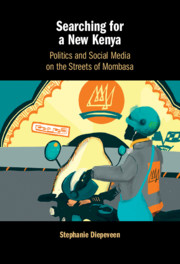'The focus on publics, at a time when scholars are revisiting the concept with fresh lenses, locates this book at the centre of one of the most important debates in African politics. Diepeveen demonstrates how social media and street parliaments in Kenya prompts us to rethink popular politics, across physical and digital spaces in Africa.'
Duncan Omanga - Social Science Research Council, Brooklyn
'In Searching for a New Kenya, Diepeveen treats public talk in the streets and on social media along the same continuum. The book provides both a finely grained empirical analysis of the role of public talk in Kenya and a deeply theorised account of the nature of publics in Mombasa informed by Hannah Ahrendt’s work. While digital technology is increasingly dismissed as invasive, extractive and controlling, Diepeveen powerfully demonstrates that the mere presence of publics - whether transformative or ineffectual - matters to people.'
Wendy Willems - London School of Economics and Political Science
'Why can apparently open and lively political discussions can end up repeating the same patterns, over and over again - entrenching divisions rather than opening up new intellectual space? In this empirically rich snapshot of spaces of public debate in twenty-first century Mombasa, Stephanie Diepeveen explores this fundamental question, showing that both physical and virtual ‘publics’ are vivid and engaging theatres of argument, yet are multiply constrained - by the expectations of behaviour that structure debate, and by the same economic and social precarity that leads people to talk politics with such energy. In a world in which apparently ever-more open debate has been combined with increasingly bitter divisions, this is an important study of a pressing issue.'
Justin Willis - Durham University
'A detailed and informative examination of people’s parliaments in Mombasa, Kenya's chief port and the center of its Muslim population, this book examines the role of street corner discussions of political, economic, and social issues. Recommended.’
R. I. Rotberg
Source: Choice
‘Stephanie Diepeveen uses rich primary sources as she brings conversations and public discussions to life in her book. It is really difficult to highlight any errors in the book in terms of its thematic preoccupation or analysis … Beyond the length of the book, one gets drawn into the narratives of the author far more than one envisioned which is a great strength that compliments the text.’
Odunayo Adeojo
Source: African Studies Quarterly



